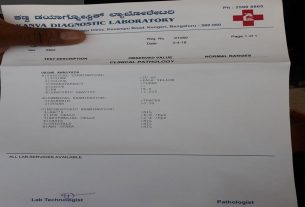School girls do not regularly receive sanitary pads under the Shuchi Scheme because of lack of appropriate distribution system.
By Apoorva GS
Shuchi sanitary pads lie undistributed in PHCs as no distribution channel has been planned for this year. Nine months have passed and government has not yet finalised the tender for distribution this year.
Dr. Veena, Deputy Director of Rashtriya Bharath SwasthyaYojana and Shuchi scheme said that the state government is unable to decide the distribution pattern for the scheme and pads lie unused in PHCs and Block Educational Offices (BEO).
Under the Shuchi health scheme for menstrual hygiene, Karnataka Government in 2014 announced to distribute pads in government schools. Students in the government schools say that they have not been receiving pads this year.
Shruthi, a 16-year-old student who studies at Gollahalli government school said, “We are not receiving any pads. Earlier I used homemade cotton pads but now my mother gets it from the medical store.”
To this, Geeta T., Head mistress of the school said, “We haven’t received any pads this year but we are managing with previous year’s stock.”
Dr. Veena said “We distribute the pads to BEO Offices and PHCs butut we don’t keep a track on the number of pads reaching the other end. At times, transportation is also an issue.” She said that it is the responsibility of the schools to collect the pads from the PHCs but most of them fail to do so.
. Head of Reproductive and Child Health Department, Bruhat Bengaluru Mahanagara Palike (BBMP), Kalavati said that they haven’t received any pads this year as the government has not decided the distribution channels. “Government should devise some method of distribution and keep BBMP out of it because we are already swamped with so much of work. Education institutions must take an initiative of collecting the pads from the distributors,” he added.
The records of Directorate of Health and Family Welfare says that the government spends Rs. 49 crore annually for the scheme and 31, 32,175 girls from 2175 schools are enrolled from both urban and rural areas in Bengaluru.
Dr. Meena, who works at a primary health centre, said, “Till last year we received the pads and educational institutions had to collect it from us. But since most of them did not turn up, it was lying unused in PHCs. But this year we haven’t received any pads so we use the surplus stock from last year.”
Not having access to proper medical care and hygiene facilities has multiple disadvantages. Dr. Vinutha Patil, a medical practitioner, said, “Not using pads can cause fungal infections, urinary tract infections, yeast infections or Hepatitis B.”, She pointed out that it is because of lack of awareness that women in rural India are deprived of and no proper access to menstrual hygiene.




